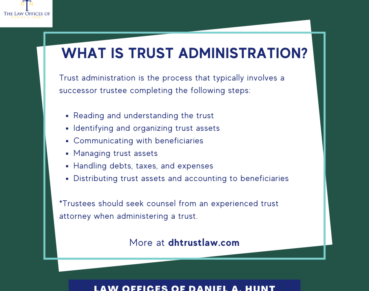Can a Trustee Resign?

One of the most important choices made when creating an estate plan is selecting a trustee to succeed you in managing your affairs when you pass away. Whether you have appointed a successor trustee or been appointed as a successor trustee, you may wonder if it’s set in stone – or can a trustee resign at a later time?
What is a Trustee?
In estate planning, a trustee is a person who holds or administers property or assets for the benefit of the trust beneficiaries. When you create a revocable living trust, you are both the grantor (aka “settlor”) AND the trustee. Once the trust creator dies, the person or people named in your trust as successor trustee will take over that role.
What is Trustee Resignation?
Is a trustee who is named in a trust required to act in this role? No, they are not. If a trustee is unable or unwilling to serve as the trustee, they may resign.
Trustee resignation sometimes occurs prior to the administration of the trust. In this scenario, the named successor trustee should inform the trust administration attorney that they wish to resign and sign a document called Declination to Serve as Trustee. Whoever is listed in the trust as the next alternate trustee would then step into that role. A trustee who declines to act prior to taking any actions relating to the trust or estate of the decedent will incur no liability from the estate administration.
At other times, a trustee may wish to resign after administering a trust for a period of time, which is a bit more complicated.
How to Resign as an Acting Trustee
If you are an acting trustee who wants to resign, the process will depend on the terms of the trust instrument. Most trusts include a provision that outlines how a trustee may resign. Usually, this procedure includes signing a Resignation to Serve as Trustee and also sending written notice and a report and account of their actions as Trustee to the trust beneficiaries.
Individual trusts differ; some may require notice to be sent to the beneficiaries of the trust only, or the alternate successor trustees only. Under the California Probate Code, the trustee must adhere to the requirements of the trust document in which they are named when resigning.
If the trust lacks a resignation provision, then the trustee should follow the California Probate Code. This states that trustees can resign:
- From a revocable trust “with the consent of the person holding the power to revoke the trust” (meaning the trust creator, if they’re alive). If this person is deceased, then the trust has likely become irrevocable and will adhere to different requirements.
- From an irrevocable trust “with the consent of all adult beneficiaries who are receiving or are entitled to receive income under the trust or to receive a distribution of principal if the trust were terminated at the time consent is sought”.
Can a Trustee Be Removed?
A final option offered in the California Probate Code is resignation or removal by a court order obtained on petition by the trustee. In this case, the court accepts the trustee’s resignation and “may make any orders necessary for the preservation of the trust property, including the appointment of a receiver or a temporary trustee.”
Trustees may be removed by court order in the following types of situations:
- The trustee fails to act, stalling the trust administration.
- The trustee has committed a breach of trust.
- The trustee is unfit to administer the trust.
- There are multiple co-trustees who cannot get along or cooperate, impeding the trust administration.
If you’re a trust beneficiary who feels that a trustee should be forcibly removed, you should seek out an experienced trust litigation attorney as soon as possible for legal advice.
If you have any other questions on how a trustee resigns, feel free to contact our law firm.
Law Offices of Daniel A. Hunt
The Law Offices of Daniel A. Hunt is a California law firm specializing in Estate Planning; Trust Administration & Litigation; Probate; and Conservatorships. We've helped over 10,000 clients find peace of mind. We serve clients throughout the greater Sacramento region and the state of California.




